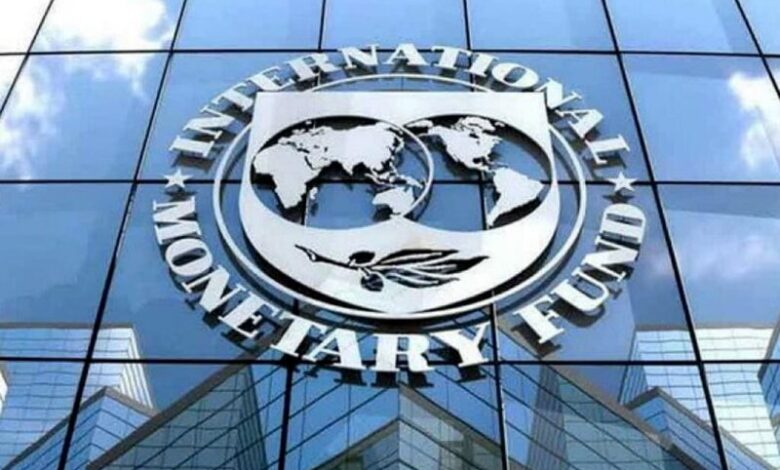UK will be second-fastest-growing G7 economy, IMF predicts


The UK is set to be the second-fastest-growing of the world’s most advanced economies this year, according to new projections from the International Monetary Fund (IMF).
But the IMF also predicts the UK will face the highest rate of inflation among G7 nations both this year and next, driven by rising energy and utility bills.
The forecasts are part of the Fund’s twice-a-year outlook for the global economy.
It said so far there had been a “muted response” to the wave of tariffs imposed on imports to the US this year, but that they were having an impact on global growth.
The IMF, whose purpose is to bring its 190 members together to work on maintaining global economic stability, is a respected forecaster. However, uncertainties, ranging from geopolitics to the weather, often derail expectations.
According to the Fund’s latest predictions, unveiled as government officials gather in Washington DC, the UK appears to be weathering the storm better than others.
The IMF predicts that in 2025 the UK economy will outperform other G7 economies, apart from the US, in what has been a torrid year for trade and geopolitical tensions.
The G7 are a grouping of the world’s richer countries, including the US, Canada, Germany, France, Italy, the UK and Japan, but not fast-growing economies such as India and China.
Despite edging ahead of most rivals, UK economic growth rates are expected to remain modest at 1.3% for this year and next.
Moreover, on a per head basis economic output is only set to grow 0.4% this year and 0.5% in 2026, putting the UK at the bottom of the G7 league table.
Chancellor Rachel Reeves who arrived in Washington on Tuesday, said people sensed the economy was “stuck”.
“Working people feel it every day, experts talk about it, and I am going to deal with it,” she said.
She will use the IMF gathering to try to provide reassurance over the UK’s financial stability and tout the country as an attractive place for investment.
Price pressures
However, the IMF warned the UK still faces stronger inflation than in other similar countries, with prices forecast to rise by 3.4% this year and 2.5% in 2026. The IMF said higher inflation was likely to be temporary and should fall to 2% by the end of next year.
Speaking at a separate event in Washington, Bank of England governor Andrew Bailey said he also believed inflationary pressures were easing, after unemployment data in the UK on Tuesday showed unemployment rising and wage growth slowing.
Highlighting the inflation forecasts, shadow chancellor Sir Mel Stride said the IMF assessment made for “grim reading”.
He said UK households were “being squeezed from all sides”, adding: “Since taking office, Labour have allowed the cost of living to rise, debt to balloon and business confidence to collapse to record lows.”
Trump tariffs loom large
The IMF’s global outlook was dominated by the reaction to US tariffs, a weakened dollar, questions about the independence of the US Federal Reserve and sky-high valuations of US tech companies, the Fund said.
The IMF said resilience was “giving way to warning signs” and that US tariffs costs, were starting to feed through to higher prices for American shoppers.
However, in an interview with the BBC, the IMF’s chief economist, Pierre-Olivier Gourinchas, said the worst consequences of a global trade war had been tempered.
“The effect of the tariff shock is there. It is negative for the global outlook. It is weighing down on investment and consumption decisions, there is trade policy uncertainty… but it’s not as bad as expected because the shock itself has been scaled down and there are these offsets,” he said.
The IMF cited Brexit as an example of how uncertainty around major changes in trading arrangements can, after a delay, lead to steady falls in investment, and he said the Bank of England should be “very cautious” about cutting interest rates as expectations around future inflation remained high.
The IMF’s forecast noted that Canada’s economy, hit hard by the trade war with the US, will be pushed into second place in the growth league table this year.
However, Canada is expected to retake second place next year when its economy is forecast to grow at a rate of 1.5%.
Germany, France and Italy are all forecast to grow far more slowly at rates of between 0.2 and 0.9% in 2025 and 2026.
AI warning
The IMF also pointed to “excessively optimistic” expectations around AI, which could trigger a market correction.
In its separate Global Financial Stability Report the IMF concluded that markets appeared “complacent”.
Mr Gourinchas said the IMF was not asserting that there would be an imminent bursting of a bubble, but that this was “one of the risks” it was looking at.
The concentration of the overvaluation of tech stocks on a small number of companies was now “substantially higher” than at the dotcom bubble in 2020, the IMF said.
However, Mr Gourinchas said the “AI investment boom” was also helping sustain US economic growth.
DISCLAIMER: The Views, Comments, Opinions, Contributions and Statements made by Readers and Contributors on this platform do not necessarily represent the views or policy of Multimedia Group Limited.
DISCLAIMER: The Views, Comments, Opinions, Contributions and Statements made by Readers and Contributors on this platform do not necessarily represent the views or policy of Multimedia Group Limited.
Source link





